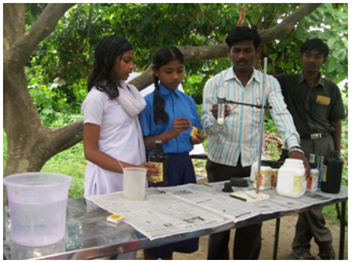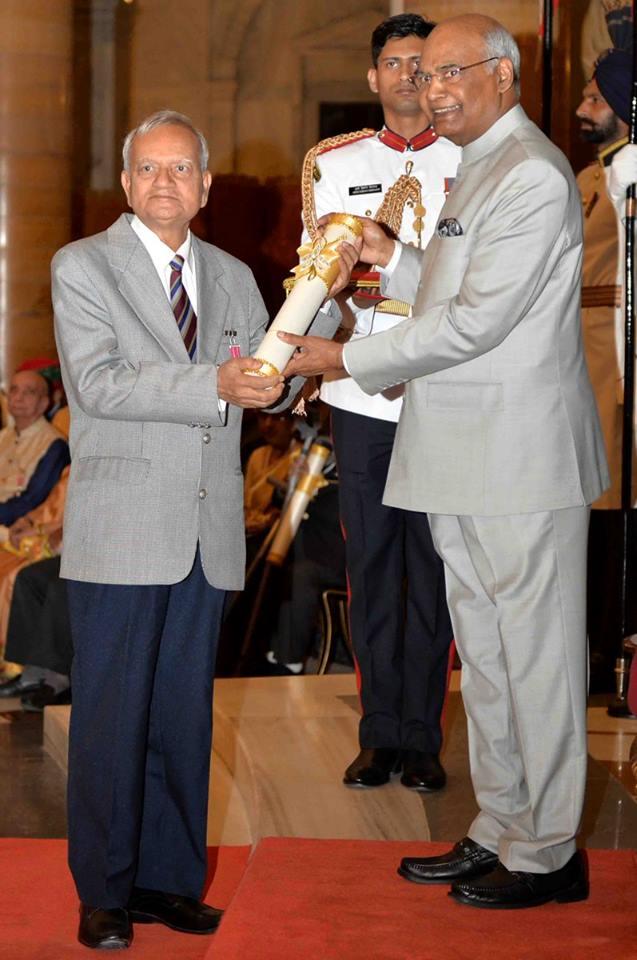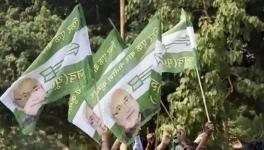The Brain Behind Tejas Takes Science to Rural Bihar

Manas Bihari Verma
In the fast moving world of short-term gains, it is rare to find someone who willingly chooses to leave the modern and convenient city life to engage with the rural population, which is why Manas Bihari Verma stands out. Verma’s journey—from being an eminent scientist for the nation’s premier defence research organisation to an educationist working in the rural region—is intriguing. Last year, he received the Padma Shri honour for his contribution to the subject aeronautical science. Nevertheless, he has continued enriching the rural population, imparting fundamentals of education.
Manas Bihari Verma was born in 1943 in Darbhanga to Yashoda Devi and Anand Kishore Lal. Lal was an active participant of M K Gandhi’s civil disobedience in 1917. His father had also helped during Vinobha Bhave’s Bihar visit for the Bhoodan movement. After completing his schooling from Jawahar High School in Madhepur, Verma pursued his graduation from Bihar College of Engineering—presently known as NIT Patna. He completed his masters in mechanical engineering from Calcutta University in 1969 with specialisation in ‘jet propulsion’.
In 1970, Verma joined the Defence Research and Development Organisation (DRDO), and started working in the aeronautical stream. During his 35-year service, he worked with aeronautical establishments based in New Delhi and Bangalore and Koraput. Verma was also designated as the director of Aeronautical Development Agency (ADA), Bangalore from 2002 to 2005.
Association with Dr APJ Abdul Kalam
Just three months after joining DRDO, Verma was shifted to Bangalore. There, he was deeply involved with Light Combat Aircraft (LCA) project and evolved the architecture and specification for all mechanical systems of the Light Combat Aircraft, incorporating latest technologies.

Manas Bihari Verma with Dr. APJ Abdul Kalam
The conceptualisation of HAL Tejas was done by a team at DRDO Bangalore where Verma had become the programme director. He led the flight test envelope to supersonic speed and 11 km altitude and completed the first phase of full-scale engineering development of Tejas. The work on this project started in 1986, under the Rajiv Gandhi government with an underlying aim of replacing 321 MiG aircraft.
During this phase of designing Tejas, Verma and his team had the opportunity to work with Dr. APJ Abdul Kalam when he was the programme director of Integrated Guided Missile Programme (IGMP), Hyderabad.
In conversation with NewsClick, Verma reiterates that Dr. Kalam was a unique man in terms of everything—personality, work and behaviour. “Even when he was loaded with responsibilities of working on missiles Agni, Prithvi, Dhanush at IGMP, he came to our rescue whenever we got stuck with administrative or technical problems and very promptly reviewed our work after completion,” recollects Verma.
Science and Service in Rural Bihar
After his retirement from ADA, Bangalore in 2005, Verma chose to return to his native village Bour in Ghanshyampur block of Darbhanga district. Acknowledging a number of issues including illiteracy and morass poverty, he decided to try his hands on imparting knowledge of basic science to the rural children. He floated Mobile Science Lab (MSL) in 2010, which aimed to camp in rural schools.
Verma told NewsClick that the initiative comprises three vans equipped with 150 instruments related to physics, chemistry and life science laboratories. “With help of the programme coordinators, we are reaching out to the schools based in rural and backward hamlets of Darbhanga and Madhubani. When I shifted to my village from Bangalore, improving Bihar’s education was my only motive,” he said.

Chemistry experiment at a government school in Madhubani
The MSL programme is run by Verma’s own non-profit organisation, Viksit Bharat Foundation, and for this, he credits Dr. APJ Abdul Kalam. “These MSLs have, so far, visited over 300 schools in Darbhanga, Madhubani and Supaul districts demonstrating scientific experiments to over one lakh students and giving computer training to about 500 students in the schools,” he said.
Computer literacy is also part of the MSL programme where students are taught basics of computer, such as Microsoft Paint, Word, Microsoft Excel, etc. Continuous effort with an aim to make science reach nook and corner of every village has made a positive impact on many students from the rural region. This programme had received financial contribution from Dr Kalam as well.

MSL-aided computer education in a rural school in Darbhanga
A renowned environmentalist and founder of Taalaab Bacho Abdolon in Darbhanga, Narayan Choudhary says, “Having Manas Bihari Verma on the land of Mithilanchal and Bihar is a matter of pride for us. Such a par excellence visionary cannot be imagined in today’s time. Manas Verma ji was the chairman of the NIT-Patna's board of governors. Despite holding such a high position, he used to come to Patna from Darbhanga in a bus to attend the board of governors' meeting. Such is his modesty.”
Choudhary adds, “In 2007, during Bihar floods, he pioneered a project, undertaking community kitchen with help of social workers for the flood-affected rural population. Seeing this, Bihar government undertook it as a mandatory measure in the following year.”
Verma has been keenly studying the River Kosi and its tributaries and impact of structural interventions on the fluvial characteristics of these rivers for the last six years. The purpose of undertaking a study on rivers is the annual occurrence of flood which is repetitive in nature. He has presented his findings in various professional forums.

Manas Bihari Verma receiving Padma Shri award from President of India
Verma has been a recipient of many awards such as Aeronautical Society of India Award for Indigenous Development of Aeronautical Stores in 1998 as Scientist G and Project Director General System ADA; DRDO Scientist of the Year Award in 2001 given by the Honorable Prime Minister of India; DRDO Technology Leadership Award (2004) by the Honorable Prime Minister of India and the prestigious Padma Shri.
However, magnitude of his contribution cannot be measured through awards and recognition when it comes to creating a parallel and most reachable institution for underprivileged sections based of rural Bihar.
Get the latest reports & analysis with people's perspective on Protests, movements & deep analytical videos, discussions of the current affairs in your Telegram app. Subscribe to NewsClick's Telegram channel & get Real-Time updates on stories, as they get published on our website.
























